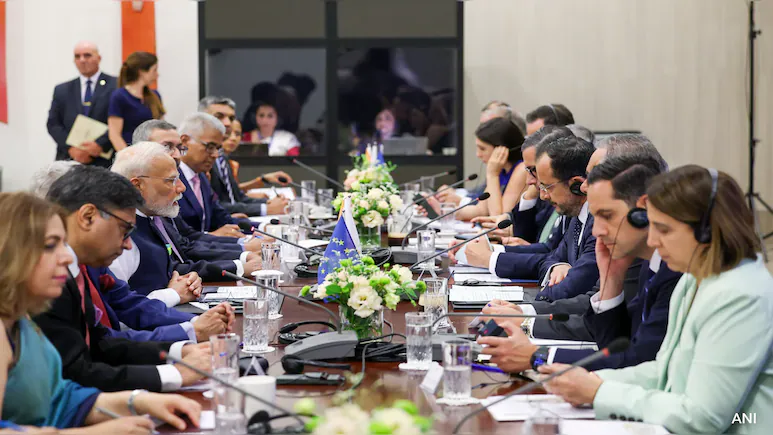Nicosia, Cyprus – Strengthening Ties Amid Global Turmoil
In a pivotal meeting on Monday, Indian Prime Minister Narendra Modi and Cyprus President Nikos Christodoulides convened in Nicosia to address pressing global concerns, affirming their mutual commitment to peace and collaboration amid ongoing conflicts in regions like West Asia and Europe. The two leaders unequivocally stated that “this is not an era of war,” underscoring their belief in dialogue as a means to resolve disputes and restore stability.
This meeting marks PM Modi’s significant diplomatic visit, being his first trip to Cyprus in over two decades and the initial leg of a three-nation tour. Throughout the discussions, PM Modi emphasized that both nations share a historic friendship built on trust and respect for each other’s sovereignty. The leaders conveyed their apprehensions about the prevailing global conflicts, highlighting the adverse effects they cast on regions beyond the immediate conflict zones.
The bilateral talks also symbolized a renewed commitment to comprehensive cooperation across various sectors, including defense, security, trade, technology, healthcare, renewable energy, and climate justice. Prime Minister Modi, during a joint press conference, expressed gratitude for Cyprus’s unwavering support for India’s efforts against cross-border terrorism, a crucial aspect of their discussions.
Addressing Global Concerns and Strengthening Bilateral Relationship
India and Cyprus have a long-established relationship, and PM Modi’s intention to utilize this visit as a “golden opportunity” to deepen ties was clear throughout their discussions. The leaders took a moment to reflect on the “horrific Pahalgam terror attack” that occurred in April, with President Christodoulides affirming Cyprus’s full solidarity with India in its fight against terrorism. He articulated Cyprus’s commitment to standing alongside India in its endeavors against terrorism in all forms.
The significance of this visit lies not only in its historical context but also in the strategic discussions surrounding geo-political dynamics. In their remarks, both leaders acknowledged the importance of finding peaceful resolutions to ongoing conflicts, reiterating that the call for dialogue and stability is imperative for the greater good of humanity. By focusing on mutual cooperation and understanding, they aim to counterbalance the negative impacts of global unrest.
The meeting also recognized recent tragedies, including the Air India plane crash in Ahmedabad, signaling a moment of shared grief between the two nations. President Christodoulides extended condolences on behalf of the people of Cyprus, further solidifying the emotional and political ties between the two countries.
As per the report by NDTV, PM Modi and Christodoulides held comprehensive talks that explored various avenues to enrich India-Cyprus relations. The Prime Minister shared his vision for future engagements, which encompass trade and investment, projecting optimism for the potential advancements in bilateral cooperation.
Transformative Initiatives and Economic Collaboration
Among the vital topics addressed was the India-Middle East-Europe Economic Corridor (IMEEC), which both leaders believe holds transformative potential for enhancing peace and prosperity in the region. PM Modi articulated his confidence in the corridor’s ability to promote economic growth and collaboration across borders, linking India with Europe and the Middle East.
During their discussions, the two leaders also assessed strategies to bolster cultural and tourism ties. PM Modi highlighted that Cyprus is rapidly becoming a preferred destination for Indian tourists, pointing to the burgeoning interest in yoga and Ayurveda in Cyprus. They recognized the need for improved air connectivity between the two nations, facilitating further cultural exchanges and tourism opportunities.
Moreover, President Christodoulides expressed gratitude towards India for its support related to Cyprus’s territorial integrity and reunification efforts. By acknowledging this critical matter, the dialogue between the two countries has paved the way for a more profound partnership rooted in mutual respect and collaboration.
Looking Ahead: Building a Sustainable Future Together
The discussions held in Nicosia have set the groundwork for a promising future of collaboration, with both leaders expressing confidence in the trajectory of India-Cyprus relations. The emphasis on mutual democracy and the rule of law as foundational elements of their partnership signifies a commitment to uphold shared values in their respective governance and international dealings.
Prime Minister Modi’s invitation for President Christodoulides to visit India further illustrates the intent to solidify their diplomatic ties. By fostering regular communication and engagement, both nations aim to explore additional avenues for growth and collaboration that transcend barriers.
In conclusion, as global challenges continue to evolve, the meeting between PM Modi and President Christodoulides stands as a testament to the importance of collaboration and dialogue. Their shared vision of peace and stability not only holds significance for India and Cyprus but also resonates with the broader international community, underscoring the critical need for unity in addressing global conflicts and enacting sustainable solutions.
For further insights into international relations and the implications of the India-Middle East-Europe Economic Corridor, readers can explore more detailed analyses on our website. Additionally, for an understanding of regional tensions in West Asia, visit this link to BBC News.
DISCLAIMER
We have taken every measure to ensure that the information in this article and on our social media platforms is accurate, verified, and obtained from reliable sources. For feedback or complaints, please contact us at info@hamslive.com.


